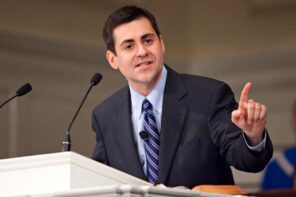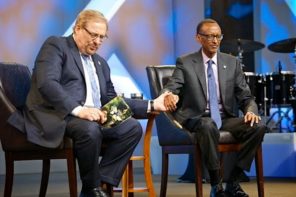Last week’s Southern Baptist Convention conference on “The Gospel, Homosexuality, and the Future of Marriage” presented a somewhat untidy hodgepodge of mixed messages as it vacillated between its stated themes of conviction and kindness.
Although Southern Baptists’ preeminent theologian Al Mohler began the conference, which brought some 1,300 Southern Baptist clergy and laity to Nashville, with a defiant declaration that Southern Baptists and their churches will never recognize or tolerate same-sex relationships, another more pastoral and conciliatory theme was later championed by the conference convener, Russell Moore. Mohler later gave a brief nod to Moore’s tone when he acknowledged that he had been wrong years ago when he said that same sex attractions could be changed, echoed by Moore who declared his disapproval of reparative ex-gay therapies. (Moore has already received some feedback from those who still see this approach as valid, like the IRD’s Chelsen Vicari, writing in the Christian Post.)
These small steps toward the unified recognition of the reality of same-sex attractions was something new for Southern Baptists. During the conference it was made clear that there was no sin or abnormality in such attractions, as long as one remained celibate. Although these changes were not seen as sufficiently meaningful by many of the LGBT attendees, they may at least be seen as an admission that most Southern Baptists aren’t quite sure how to relate to gay people.
Moore also admitted that Southern Baptists have failed miserably at sustaining and demonstrating healthy marriages and thus are as prone to divorce as the rest of the culture, which may be seen as a nod to critics who question Southern Baptists’ right to make judgments about the legitimacy of gay marriages.
Moore also called for all Southern Baptists to “relate to lesbians and gays in a different way” (the omission of “B”s and “T”s was likely intentional), challenging Southern Baptists to take a step back from their “belligerence, outrage, and condemnatory preaching,” and adding that:
Many of the people who disagree with us want the same things everyone else wants—companionship, love, and dignity—and think marriage redefinition will get them there. You and I disagree with them on this, but we cannot reach them if we don’t understand who they are and why they think the way they do.
Moore pointedly confessed that “we are all too often mean and nasty when it comes to people who disagree with us,” and condemned anti-gay bullying, calling on Christians to address the problem of homelessness for gay and lesbian youth as “a human dignity issue.” Moore emphatically declared that parents should never shun their gay children.
Moore and other conference leaders appeared to be caught off guard by the number of LGBT Christians and supportive Christian advocates, some Baptists, who not only attended the entire conference, but also respectfully and publicly responded to Moore’s call to kindness and understanding and offered to meet with conference leaders at the venue. Although there were evidently no face-to-face meetings with Moore, about a dozen LGBT Christians and LGBT advocates did meet privately with the same number of conference participants for dialogue on Monday evening, though they agreed that they wouldn’t comment about it afterward. In addition, Matthew Vines, author of God and the Gay Christian, met privately and off-the-record with Al Mohler during the conference. ThinkProgress also interacted with clergy and laity in those public sessions.
It will be fascinating to see how dialogue between the LGBT Christian community and Southern Baptist leaders develops in the coming months, if it does. Russell Moore may have not had this level of conversation in mind when he called for congregations and individuals to seek to understand who LGBT persons are and why they think the way they do. Now it’s up to him to demonstrate exactly what that process should look like and to enter into face-to-face conversations with those who have respectfully responded to his call for meaningful discovery and discourse.
[Note: For videos of the conference sessions click here.]



